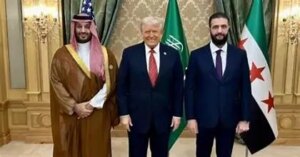The Geopolitical Chessboard: Syria’s New Era and the Role of International Powers

In the ever-evolving landscape of global trade and politics, one might find it surprising that economic collaboration can serve as a catalyst for geopolitical alliances. The recent diplomatic thaw between the United States and Middle Eastern nations such as Saudi Arabia and Qatar highlights this phenomenon. Remarkably, this engagement now also includes emerging dialogues with leaders from Syria, reshaping the contours of modern diplomacy.
A Controversial Meeting: Trump and Al-Sharaa
The turning point came with former President Donald Trump’s unprecedented meeting with Syrian President Ahmed al-Sharaa, a controversial figure with a turbulent past. Once designated as a global terrorist, al-Sharaa was embroiled in a series of violent operations against both local and foreign interests. His sudden ascent to prominence raises questions: Is he merely a puppet strung along by international powers, or is there a deeper strategy at play?
Al-Sharaa’s story is not just one of violence and terror; it reflects the complexities and ironies of U.S. foreign policy. Released by American forces after years of combat, some analysts suggest he may have been rebranded as a necessary asset in a convoluted geopolitical game. The lifting of U.S. sanctions following Trump’s engagement illustrates that diplomacy may sometimes override ethical considerations.
The End of an Era: Russia’s Dwindling Influence
The longstanding Russian alliance with the Assad government is crumbling. Criticism from the Syrian populace regarding Russian military operations, often linked to civilian casualties, indicates a significant shift. The Russian presence has increasingly been seen as a liability rather than an asset, jeopardizing their influence in the region.
It is crucial to recognize that the real motivations for meddling in Syria stretch beyond the humanitarian façade. Economic interests—particularly the control of energy routes—have consistently underpinned U.S. actions. The prospect of a Qatari gas pipeline threatened Russian gas dominance in Europe and added combustible fuel to the fire of neoconservative ambitions.
The Rise of a New Government
As of March 2025, Syria has transitioned to a new interim government that, for better or worse, reflects a mix of various societal factions. With a diverse cabinet designed to appease international stakeholders, the current administration aims to reshape the country’s economy and political landscape. However, it’s worth noting that Hay’at Tahrir al-Sham (HTS) retains the reins over critical areas, including defense and foreign affairs—raising questions about the legitimacy of this new government.
The Importance of International Investment
Saudi Arabia and Turkey are now aligning their interests towards stabilizing Syria, advocating for the removal of U.S. sanctions. This is not simply an act of goodwill; it is a well-calculated economic strategy. Saudi Crown Prince Mohammed bin Salman has hinted at significant investments aimed at elevating Syria’s economy, while also securing Gulf investments vital for regional stability. Recent commitments to invest in sectors including defense, energy, and mining signal a united front ready to reshape the Middle Eastern economic landscape.
The Economic Situation: A Rock and a Hard Place
Despite recent developments, Syria’s economy is in dire straits. The nation boasts an estimated 2.5 billion barrels in proven oil reserves, yet output has plummeted drastically. At its peak, Syria produced approximately 385,000 barrels per day, but this has dwindled to a fraction. The emergence of the Syrian Democratic Forces (SDF), who currently dominate oil production, complicates the situation further. While the new government aims to stabilize production, the need for around 150,000 barrels daily merely to meet domestic demand underscores the uphill battle ahead.
The Art of Regime Change: A Game of Influence
In the grand scheme of global politics, Syria has become a battleground for influence among major powers. The strategic removal of sanctions and encouragement for investment vessels may be a broader tactic to wrest control from Russia, while simultaneously creating a façade of legitimacy for the new regime. With the SDF still not integrated into the national framework, tensions will undoubtedly simmer in the background.
Final Thoughts
As the geopolitical chess match continues, every move counts. The fragile balance in Syria presents both opportunities and pitfalls, not just for the nations directly involved but for the global community as well. At Extreme Investor Network, we aim to provide insights that help you navigate these turbulent waters. Understanding these multifaceted dynamics is crucial for making astute decisions in a world where economics and geopolitics are inextricably linked.
Stay sharp and invest wisely as the winds of change blow through the Middle East.

